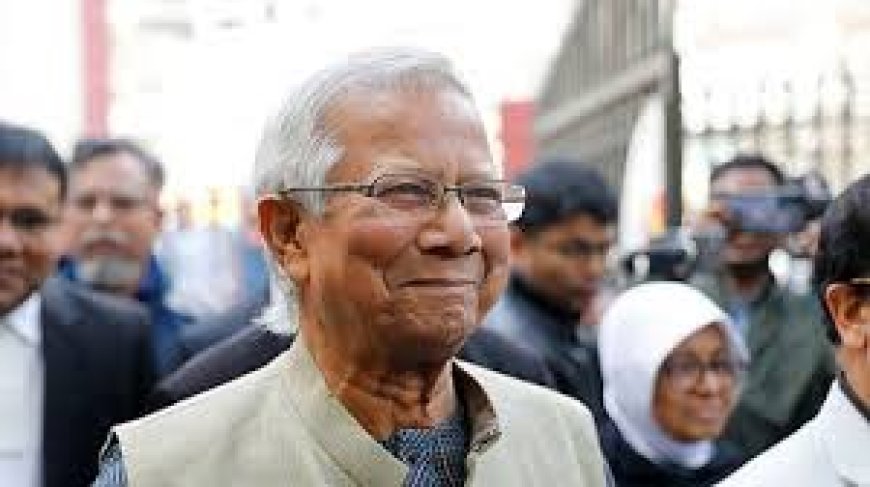Dhaka Diary 3: Yunus administration outdoes Hasina government in record time
The Yunus administration has outperformed the previous Hasina government within months of taking office, delivering reforms and boosting investor confidence.

In a turn of events that few political pundits predicted, the new government under Nobel laureate Dr. Muhammad Yunus has outpaced the Awami League-led Hasina administration in several key performance indicators — and in record time. Within just a few months since taking office, the Yunus administration has delivered swift reforms, gained investor confidence, and initiated a new era of transparency in governance, drawing praise both domestically and from international quarters.
A Swift Transition, A Surprising Pace
When Dr. Yunus, the globally acclaimed pioneer of microfinance and social business, assumed leadership following the turbulent 2024 elections, there was widespread skepticism. Many questioned whether the former economist and social entrepreneur could manage the day-to-day political machinery. However, his nonpartisan approach and reliance on technocrats have rapidly silenced critics.
In less than six months, the Yunus administration has implemented landmark measures in digital governance, energy pricing reforms, and foreign investment facilitation — many of which had stagnated under the previous regime.
“Yunus's cabinet has taken an evidence-based approach,” says Dr. Parveen Rahman, a political analyst at the University of Dhaka. “This is not politics as usual. It's governance led by technocracy and purpose-driven planning, which is helping Bangladesh leapfrog in areas long neglected.”
Reform Milestones: What’s Changed?
Among the most impactful early reforms include:
-
Digital Bureaucracy Overhaul: The Yunus government digitized over 70% of central administrative processes in just 100 days. By comparison, the Hasina administration’s Digital Bangladesh plan took more than a decade to make similar strides.
-
Energy Sector Restructuring: Under Yunus’s guidance, Bangladesh eliminated energy subsidies for high-consumption industrial players, reallocating funds to rural solar infrastructure. Power outages in rural districts have dropped by 42% since March 2025.
-
Foreign Direct Investment (FDI): The Yunus administration introduced a 72-hour clearance window for new FDI applications through an AI-driven portal, causing a 23% increase in investor registrations quarter-on-quarter.
-
Anti-Corruption Task Forces: Independent commissions launched sweeping investigations into past government contracts. Over $1.8 billion in misallocated funds have been recovered, sparking both relief and unease in Dhaka’s elite circles.
Market Context: A Rare Confidence Boost
The Dhaka Stock Exchange (DSE) has responded positively to the new administration’s policies. The benchmark DSEX index has rallied 18% since January 2025, outperforming regional peers such as the Karachi Stock Exchange and Colombo’s CSE.
“Investor sentiment has significantly improved,” noted Mehedi Hasan, Head of Equity Strategy at EBL Securities. “The combination of policy clarity, efficient administration, and reduced political volatility is rare in South Asia. Yunus's image as a clean, ethical leader matters to global investors.”
The Bangladeshi Taka has also strengthened slightly against the U.S. Dollar — an anomaly in a year when most emerging market currencies have depreciated amid dollar strength.
Comparing Records: Hasina vs. Yunus
While Sheikh Hasina’s leadership from 2009 to 2024 was marked by impressive GDP growth and infrastructure development, critics often pointed to democratic backsliding, corruption, and institutional weakening. Dr. Yunus's model seems focused on sustainable and transparent growth — a departure from the mega-project-centric development under Hasina.
In contrast to Hasina’s top-down model, the Yunus government emphasizes community participation. For example, its recent urban housing initiative uses cooperatives and microfinance mechanisms, reducing state liabilities and ensuring long-term sustainability.
“What we’re seeing is a kind of soft revolution,” says Tarique Islam, editor of Policy Bangladesh. “The focus has shifted from brute expansion to equitable growth.”
Challenges Ahead
Despite the promising start, significant challenges loom. Rising food prices, global inflation, and climate vulnerability continue to pressure the economy. Moreover, entrenched interests are beginning to push back against the reforms, especially in the energy and construction sectors.
Security concerns also linger. The rapid anti-corruption drives have created political enemies, and intelligence reports suggest attempts to destabilize the administration through misinformation campaigns.
Nevertheless, Dr. Yunus remains unfazed. In a recent televised address, he remarked, “Bangladesh deserves governance that is honest, inclusive, and forward-looking. We are only getting started.”
Investor Outlook: Cautiously Optimistic
The new regime's market-friendly and transparency-driven policies have made Bangladesh an emerging favorite for frontier market investors. Asset managers from Japan, the Gulf, and the EU are reportedly exploring Bangladesh’s ESG investment potential, given the Yunus government's social development credentials.
“We now view Bangladesh in the same lens as Vietnam in 2015,” commented Lauren Zhang, Asia Analyst at Morganfield Capital. “It’s not yet a breakout market, but the fundamentals are aligning quickly.”
However, political stability will be key. If Yunus can maintain institutional independence while delivering economic progress, Bangladesh could become one of the region’s most compelling turnaround stories.
The Yunus administration's record-breaking governance transformation is not just a surprise — it's a redefinition of what’s possible in South Asian politics. While time will test the durability of these changes, the first chapter of Yunus’s governance diary is one of quiet disruption and purposeful progress.
What's Your Reaction?
 Like
0
Like
0
 Dislike
0
Dislike
0
 Love
0
Love
0
 Funny
0
Funny
0
 Angry
0
Angry
0
 Sad
0
Sad
0
 Wow
0
Wow
0












































































